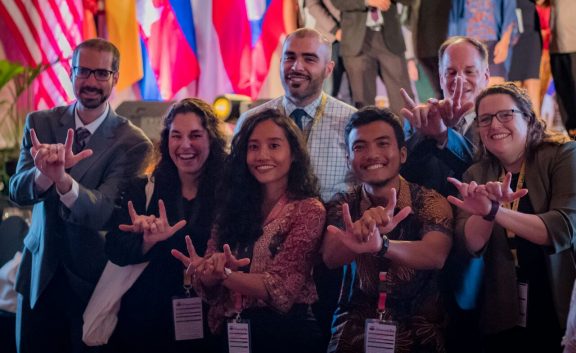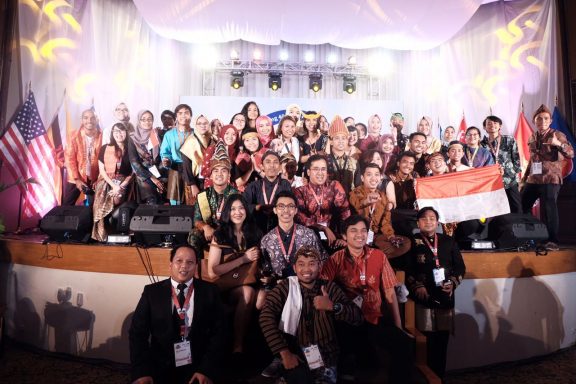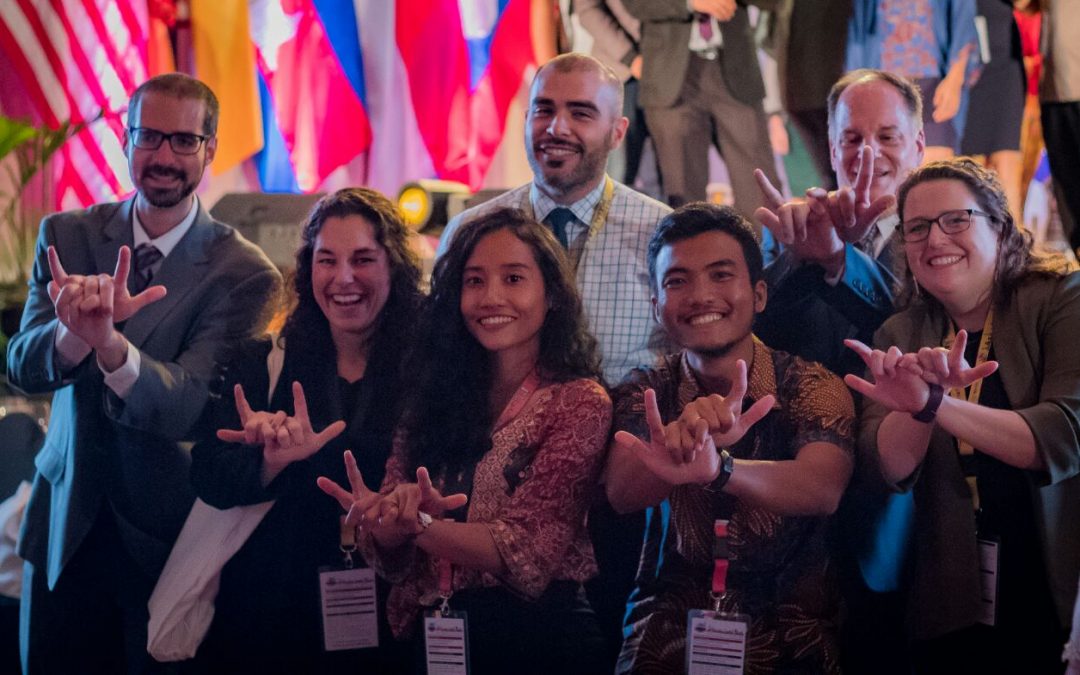From October 17-21, 2017, I was selected to participate in the annual Young Southeast Asia Leadership Initiative (YSEALI) Summit in Philippines, together with 250 YSEALI alumni from 10 Southeast Asia countries. The YSEALI Summit event is sponsored by the United States Government and organized by Cultural Vistas, creating mentorship for young leaders from countries within the within the Association of Southeast Asian Nations (ASEAN) to address complex political, social, economic and environmental issues confronting ASEAN. This year YSEALI Summit is slightly more special than the previous years because in this event we also celebrated both ASEAN’s 50th anniversary and the 40th anniversary of the partnership between ASEAN and the United States. I was very excited to participate in this program, as I had the opportunity to meet YSEALI Generation: Ocean workshop fellows that I met in 2015, as well as MantaWatch alumni, Rafid Shidqi, who was one of the delegates from Indonesia.
The YSEALI Summit experience started with five weeks virtual activity, including five weekly tasks for the delegates to complete. All delegates were divided into 25 teams, who had to create a project summary that would be presented at the YSEALI Summit in Manila. The post-summit would then be held on December 3, 2017 where all the projects submitted will be launched through YSEALI YOUnified, an ASEAN-wide youth-led community service campaign. On the first day of the YSEALI Summit, we learned about System Thinking with Matthew Cosby, Project Manager of U.S Army Corps of Engineers in Philadelphia. System Thinking taught me to look at the world in terms of systems of inter-related processes and networks, where everything is connected to one another. I learned how to use system thinking as a tool to identify a problem and look at environmental, social, and economic factor to solve the problem.

U.S Representative of Cultural Vistas shows his support for manta conservation with Tami Roriris and MantaWatch Alumni Rafid Shidqi
Next I participated in a Focus Panel on “Fish Not Plastic: The Case of Reducing Plastic Waste for Sustainable Fisheries” with Dave Albao, Executive Director of Philippine Reef and Rainforest Conservation Foundation. We learned how to identify elements and form potential partnerships in tackling marine pollution issues, applying the concept of System Thinking for marine conservation strategies in Southeast Asia. In this panel discussion, I was excited to meet other YSEALI Fellows who are working on marine and conservation efforts in their home countries. We were able to discuss and share our experience working in the same field. In this focus panel, one thing that stuck in my mind was Dave’s quote, “System Thinking is about thinking of other’s feelings”. When we talked about marine conservation, often people focused only on the environmental aspects, without considering the needs of food and income for specific groups of people. With system thinking, I have learnt to find solutions by looking at the system as a whole process and identifying key elements to solve the problem, also considering the cause and effect.
The second day of the Summit was about Collaboration. I attended a collaboration plenary with guest speaker Marcia Czarina Corazon Medina-Guce, Political Governance Fellow at the Institute for Leadership, Empowerment, and Democracy (iLEAD), who leads initiatives for development of new and expanded policy, program, and capacity-building engagements related to data journalism, open data, and open government in the Philippines. In her session, I learned the importance of collaborating with others and how to act as a bridging leader; to bridge and bring people together in order to co-own your mission in solving particular issues. It is also important to treat others as an equal voice, design with them, agree about the objectives or outcomes that we want to achieve together and build trust with one another. The phrase “Collaboration is not just a buzz word, it is an outcome in itself” really resonated with me, I felt that this bought together the underlying tone of the speech and enabled me to view an outcome from many perspective to achieve collaboration. Once we have built strong collaboration within multiple partners, it will be easier to achieve our outcomes.
As a part of the YSEALI Summit, we participated in YSEALI Games, a series of interactive mental and physical activities intended to motivate our engagement with the YSEALI Summit and our fellow delegates. The YSEALI Games consisted of social media challenges, outdoor low rope activities, and an ‘Amazing Race’ through Manila’s historic Intramuros district. After attending a seminar on collaboration, all teams competed in the YSEALI Race to finish the 10 challenges within 2 hours. Personally I felt this game was very challenging as we needed to have detailed knowledge about ASEAN countries — including their well-known statues, buildings, national mottos, etc — as well as effective team work and strategies. After two hours full of excitement and sweat, the second day of the YSEALI Summit ended with Boodle Fight — a traditional Filipino cuisine — at San Diego Gardens.

YSEALI summit delegates from Indonesia
The third day of the YSEALI Summit began with YSEALI Games outdoor activities – Low Ropes. We worked together with other teams to complete four team building activities using ropes, wood, tires, and planks. I found this game to be about leadership, team work and effective communication. It facilitated further engagement with each other after finishing the challenges. Having been energized with outdoor activities in the morning, we continued the plenary seminar on Communication and Negotiation with Syafiq Dato Metassan, YSEALI Professional Fellowship Alumni, and ICONS Project Simulation with Devin Ellis, Director of the ICONS project. In this session, I learned that the key of communication is exercise. Communication is an effective tool to improve negotiation skills, therefore these two skills are very important to have in our professional endeavors. Any negotiation needs to be approached with an understanding of perceptions, self-interest, and crafting outcomes beneficial to both sides.
In the ICONS Project Simulation, each delegates was given a specific role to play. I acted as a Municipal Government Coalition, and our role was to negotiate with different range of stakeholders – from government to local indigenous people, which had different interests on the main issues. Our goal was to reach a final decision and agreement on solving waste management problems that work for every stakeholders. In this simulation, I learned how to make people think about what is important for the greater good, put aside any political and self-interests, and work with the other parties to explore alternative solutions
Practicing Systems Thinking via the ICONS Project Simulation
On the last day of the YSEALI Summit, I had the unique opportunity to hear directly the remarks on “The Next 40” with Acting Assistant Secretary of State, Susan Thornton. In this session, Assistant Secretary Thornton mentioned that strong cooperation and training among the youth are imperative to ensure a brighter future. YSEALI aims to bring together youths across ASEAN and believes that the young generation is the future of ASEAN. By bridging prospective leaders and building professional networks across the nations, ASEAN would create strong and powerful ties in the future, capable of creating changes globally.
After hearing the opening remarks, we played “The Next 40” Futures Simulation with Dan Strobel, former East-West Centre Leadership fellow. This simulation focused on the specific issues confronting our world and its impacts towards the future. My team had chosen climate change as our main problem and started to figure out the problems that might come in the future. In this simulation, we implemented our learnings from System Thinking, defining the problem and solution with a more specific approach, and shared ideas on how ASEAN should be in 40 years.
At the end of YSEALI Summit, the project teams that earned the highest number of points in the YSEALI Games through the team activities were awarded larger amounts of seed funding to implement their post-Summit project. My team pitched an online to offline platform that provides an ecosystem for young entrepreneurs to help create local economic opportunities and encourage small business development. My team successfully generated USD $4,115 in seed funding and have started to develop our project to provide entrepreneurial guidance and training to youths living in rural areas in Phnom Penh, Cambodia.
The learning experiences I gained during the YSEALI Summit will really support my professional development and become invaluable when I bring them back to Indonesia. My YSEALI experience provided me with examples of using resources throughout the community and implementing activities and events which spotlight different issues and opportunities facing the community. Lessons on collaboration, communication and negotiation were also important as my role as MantaWatch’s Sustainable Tourism Assistant involves collaboration work with local governments, communities and businesses to improve the implementation of sustainable marine wildlife tourism in Komodo National Park.


